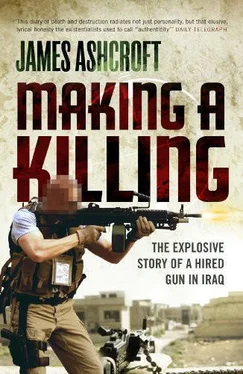‘We’re saving people’s lives here, don’t you see that?’ he said.
‘By risking our lives,’ I replied. ‘You get Spartan a convoy escort contract, and we’ll bring in as many convoys as you can wave a stick at.’
‘You think I’m Houdini? You think I can conjure contracts out of the air. There’s a process.’
‘Then get the ball rolling.’
Our policy at Spartan was to be only out on the street for the minimum amount of time required for our principal to carry out necessary site visits. Instead, we were rolling eight hours a day because the Colonel was constantly trying to impress any general or State Department official who might give him a favourable report.
‘Listen, boy, this isn’t about me,’ he said, lowering his voice. ‘I’m just trying to do what I can for the people of I-raq . We came to this goddamn country to bring democracy.’
‘I thought it was to get rid of Saddam’s WMD?’
‘WMD. Democracy. You sound like the New York Times . There’s no difference. That’s what you people don’t understand.’
‘What I do understand is our contractual obligations, and that is to guard you and only you.’
Colonel Hind was the water man but I thought he had his own agenda. We would set out to inspect some irrigation facility and find ourselves in a lumber yard counting telephone poles. One time we went to a steel works and ended up escorting a fleet of trucks carrying gun towers for the American bases, vast welded monsters, just one fitting prostrate on a flatbed truck. The convoy was so slow an old Iraqi man on a bicycle passed us without losing breath. If we had come under contact, we had the gun towers and no big guns.
It came as no surprise to me that when convoys of petrol tankers started being attacked, Hind began a campaign to get himself involved with security. He was the water man. But oil is the lifeblood of Iraq. No one went anywhere by foot except goat herders and women lugging Calor Gas canisters, the people too poor to be worth abducting or killing.
Oil is Iraq’s saviour and its tragedy, its only source of income and the cause of all its problems. Sammy, though always spick and span, smelled faintly of petrol, and it wasn’t his aftershave. Every time you saw him wander into the company car pool he was carrying a five-gallon jerry can with a length of rubber tubing around his neck. We could fill up in the CPA. Sammy was denied this luxury and siphoned gas from our vehicles whenever he was on a job for Spartan.
The problem getting gas into the gas stations in a land floating on oil was a major headache. When you have ten-mile tailbacks outside filling stations you get civil unrest. There was civil unrest anyway. What the Americans didn’t need was the people rising up in a country where everyone is highly strung and armed with an AK-47. When the Coalition overthrew Saddam, Iraqis were promised freedom and so far we had delivered little more than satellite dishes and Internet porn. Now they were defeated we could entertain them to death. Cars were crossing the desert from Syria and Turkey carrying volunteers for the insurgency and gear for the black market: TVs, laptops, Game Boys and DVDs of movies that wouldn’t be released in London for months. Where they got their petrol supply from was anyone’s guess.
Queues at gas stations were a self-fulfilling prophecy. Drivers would see a line, realise the tank was half full and pull over just in case. For a taxi driver, it was more economical to line up for gas all day with his boot and back seat full of jerry cans and put his family on the side of the road selling gas at five times the regular price.
Filling station bosses ran their own jerry can fiddles and would keep their cousin on one of the pumps filling jerry cans for gangs who controlled the market in their own strip of Baghdad. When the station managers couldn’t be bothered filling jerry cans, they’d announce that the station had ‘run out’ and close down, only to re-open after hours to sell the benzene at inflated prices. No one who lined up legitimately was going to make a fuss. The station managers were armed and protected by the local hard man for one thing, and for another, this was the custom, a way of life understood and practised by everyone. The schoolteacher who had to pay the jerry can boys five times the true rate for his gas charged parents to pass their children when they took their exams at college.
All this was very un-American and for the Americans it was so crucial to keep the gas stations filled and the prices fair. They were paying KBR a fortune to bring in convoys of benzene from Kuwait◦– taking coals to Newcastle, to quote the old adage◦– and were fighting bandits every inch of the way.
When the electricity was down, as it was practically every day, the petrol pumps didn’t work. Petrol tankers would be sent in, but delivery from tankers is gravity not pump driven, the process is slow and the tailbacks would stretch back twice as far as usual. This made good footage for the Iraqi and international media, but it was essentially a false picture because many gas station managers would say adios to the security escorts accompanying the petrol tankers, then hop up with the driver and head for the backstreets to sell the gas like the jerry can boys at five times the normal rate. Either that or sell the entire tanker to a criminal gang.
There was a lively market in ripped off petrol tankers, as our team at Spartan would soon find out.
The oil infrastructure was next to useless. As fast as KBR could cut ditches and lay new pipelines, fedayeen planted bombs and blew them up again. Petrol stations were coming under attack. The second-biggest oil fields in the world, and across most of Iraq there were shortages at power stations resulting in electrical shutdowns and more angry confrontations between Coalition Forces and irate citizens. It wasn’t as bad as this under Saddam , they’d say. And they were right.
The problem hit home to us when our guards started calling in to say they couldn’t come into work because they had drained the gas from their cars to fill the tanks of vehicles belonging to family members who had an emergency. When their big families didn’t have emergencies, the guards were sucking the benzene from their vehicles to power the generators bought on the black market with the $150 a month we were paying them. They were staying cool with air conditioning, keeping up to date with the news from Al Jazeera and picking up assault tips watching Black Hawk Down .
When there were shortages, people would come to me and ask why we weren’t doing anything about the situation. Come on, you’re the white man, what’s going on? Sometimes it was like living in a Monty Python sketch. They would spend the night digging up the electricity cables to sell for the copper, then the local headman would come to me to ask why their new TV wasn’t working.
‘You are here to help us.’
‘Yes, but you have to help yourselves.’
‘We are helping ourselves.’
Iraqis have a sense of humour.
John Hind got his big break just before Christmas and must have dreamed of his one-star gleaming like the star over Bethlehem, which wasn’t far from us. Just a Scud’s flight from Baghdad.
He convinced the CPA that on his water inspection trips he had acquired good local knowledge and that he was the best man to liaise with the military escorts bringing in convoys of oil tankers. As the Water Man, he saw it as his duty to get oil to the refineries in Baghdad in order to keep the power stations going. Without power, his water purification plants would fail. If the Coalition Provisional Authority was worried about civil unrest when there were petrol shortages, he said, then just wait and see what happens when the local population runs out of water.
Читать дальше












